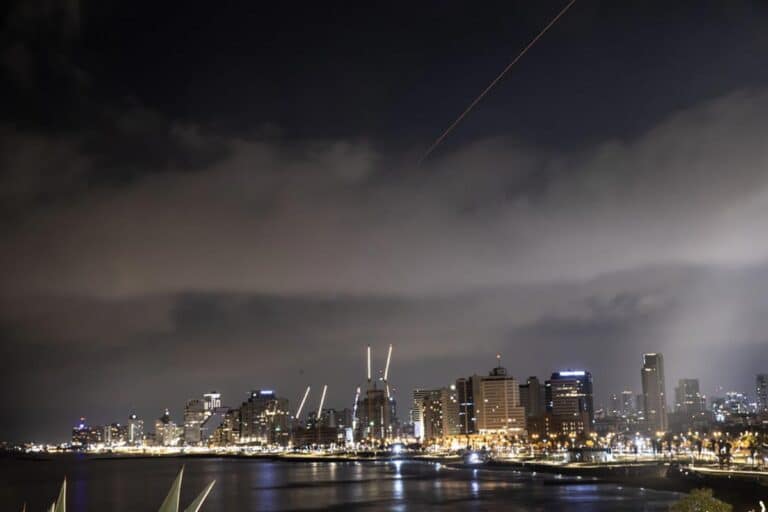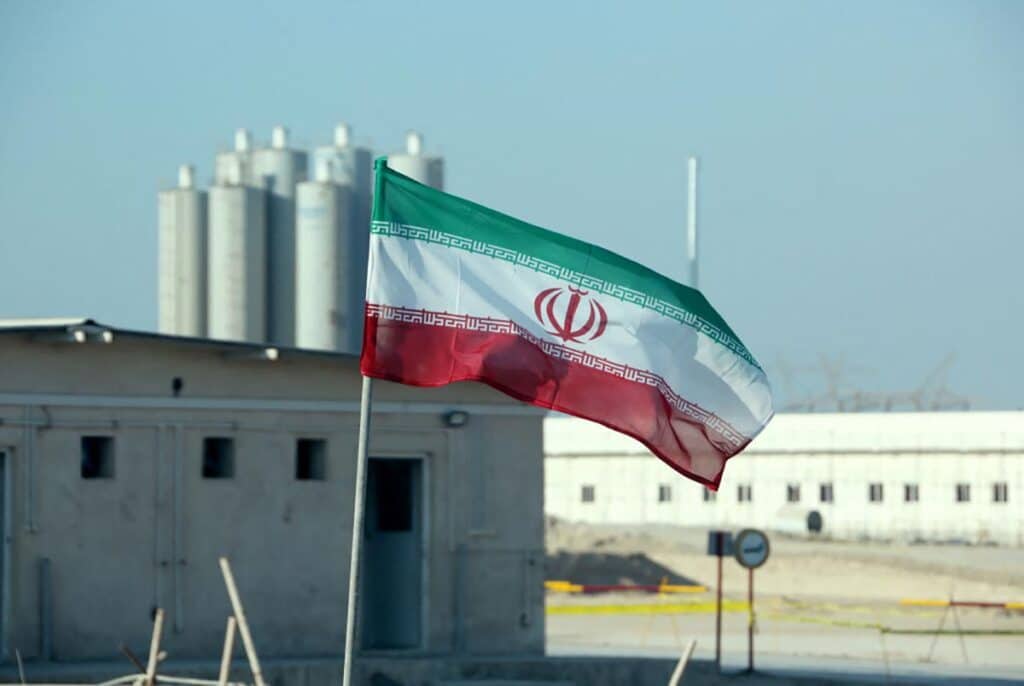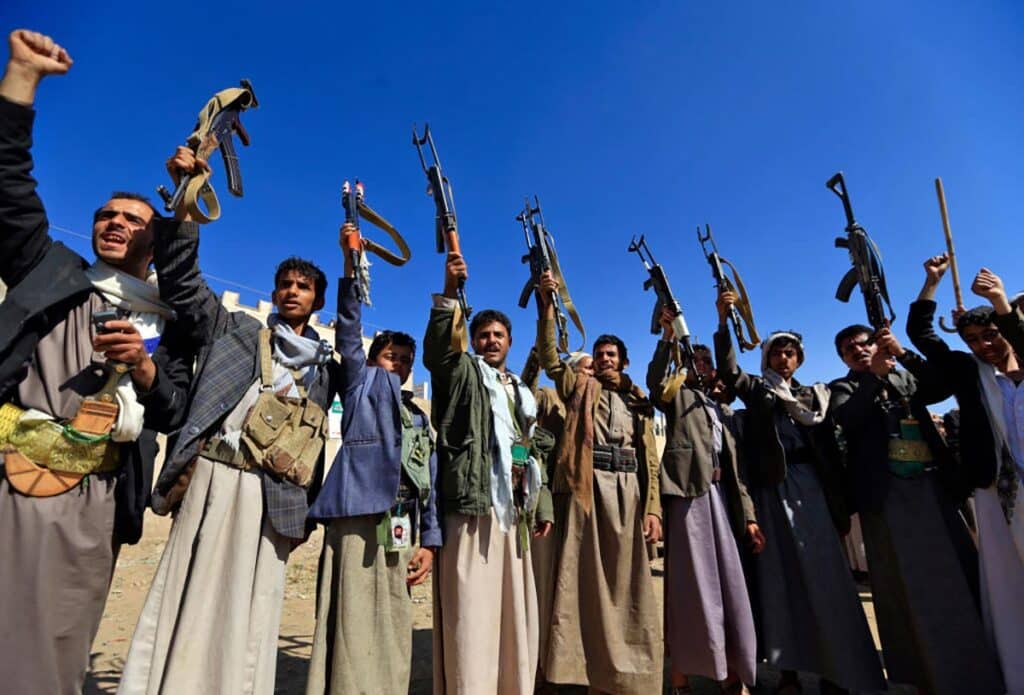
Iran launched over 300 drones and missiles toward Israel on Saturday night, marking an unprecedented attack in the longstanding conflict between the Iranian regime and Israel.
The attack came in response to an airstrike blamed on Israel that targeted the Iranian consulate in Damascus earlier this month. Mohammad Reza Zahedi — a commander in Iran’s Islamic Revolutionary Guards Corps responsible for operations in Syria and Lebanon — and several other senior IRGC officials were killed in the strike.
The Iranian attack triggered waves of rocket sirens in northern and southern Israel, as well as the Jerusalem area. Videos from across Israel showed interceptors streaking through the skies of Jerusalem and northern Israel to confront the Iranian threat.
תיעוד מדהים של יירוטים מעל הכנסת ובשמי ירושלים
— אברהם גרינצייג (@avigrin10) April 13, 2024
צילום: אלחנן גולדברג pic.twitter.com/xyZKm4dhWB
A combined effort by the IDF, along with forces from the U.S., the U.K., Jordan, and France, managed to intercept 99% of the drones, cruise missiles, and ballistic missiles. Most of the Iranian threats were intercepted outside of Israeli airspace.
Despite the effectiveness of the missile defense systems, a 7-year-old girl from a Bedouin village in southern Israel was seriously wounded by missile shrapnel during the attack. No other serious injuries were reported. Minor damage was caused to an IDF base in southern Israel.
With the Iranian assault ending early Sunday morning, the critical question now is: What comes next? Let’s break down three potential options for how Israel might respond.
Option 1: Striking Iran
The first option Israel has is to directly strike Iranian territory.
The Iranian attack was unprecedented in its size and was the first major attack conducted directly from Iran against Israel.
While it came in response to an Israeli airstrike, there’s now a serious concern that attacks like this could become the new norm. With that possibility on the table, many Israelis are pushing for a strong military response in order to deter Iran from doing this again.
War Cabinet minister Benny Gantz warned on Sunday that Israel would “exact a price” from Iran “in the way and at the time that suits us.” However, his statement leaves considerable flexibility regarding the specifics of the response.
What could Israel strike in Iran?

If Israel decides to strike Iran, there are two major categories of sites it could target: missile sites and nuclear facilities.
Iran has several major missile sites, including the Imam Ali Missile Base and the Bakhtaran Missile Base, as well as several other production and launch sites throughout the country.
In terms of nuclear facilities, Iran’s main ones are two sites used for enriching uranium at Fordow and Natanz.
Iran also has nuclear technology facilities in Isfahan and Parchin, which is believed to be used for missile production and nuclear weapons research.
Any of these facilities could be potential targets in an Israeli response, but there are also significant factors that complicate such a decision. Let’s examine the reasons that might deter Israel from launching a strike against Iran.
Reasons why Israel wouldn’t strike Iran
Western and regional leaders have been urging Israeli leaders to exercise restraint and prevent the situation from escalating further.
U.S. President Joe Biden reportedly told Prime Minister Benjamin Netanyahu in a phone call overnight that the U.S. would not support an Israeli strike against Iran.
I just met with my national security team for an update on Iran’s attacks against Israel. Our commitment to Israel’s security against threats from Iran and its proxies is ironclad. pic.twitter.com/kbywnsvmAx
— President Biden (@POTUS) April 13, 2024
If Israel were to strike without the support of the U.S. or other allies, it could risk facing the next Iranian assault alone or create resentment among allies if they’re forced into the conflict.
However, speaking on NBC’s Meet the Press on Sunday, U.S. National Security Council Spokesman John Kirby stated that “support for Israel’s self-defense will stay ironclad. It will not change.”
In addition to the political and diplomatic factors, there’s also the issue of actually hitting the targets. Striking Iran is a lot easier said than done.
First, Iran is over 1,000 miles from Israel, a distance that’s managable for commercial airliners but problematic for fighter jets, which consume fuel at a much faster rate. Even the F-35, the most advanced fighter jet, has a range of just over 1,000 miles, making a round trip without refueling difficult.
A strike on Iran would likely require tanker planes that can refuel the jets in the air, something which Israel is lacking but the U.S. has.
Second, many of Iran’s more sensitive missile and nuclear facilities are located deep underground. Israel would need powerful explosives to damage them and even that might not be enough.
Israel currently lacks these powerful munitions, known as bunker busters, which are needed to damage those sites, and would need to acquire them from the U.S. This is unlikely to happen if President Biden isn’t on board with the attack.
Raz Zimmt, a senior researcher at Israel’s Institute for National Security Studies, told The Wall Street Journal on Sunday that even a successful attack would only delay Iran’s nuclear program by a year at most.
Zimmt added that such an attack could exacerbate the situation, pushing Iran to accelerate its nuclear weapon development and triggering a dangerous regional arms race.
Beyond military action, Israel also has the opportunity to leverage international diplomacy. The recent attack has shifted global perspectives, potentially revitalizing Israel’s diplomatic strategies and alliances.
Option 2: Diplomatic responses and regional alliances

While under attack on Saturday night, Israel went from being increasingly isolated due to the Gaza war to receiving global support on a level similar to right after Oct. 7.
Leaders across the globe published statements condemning Iran and expressing their support for Israel. Leaders of the U.S., the U.K., Japan, and European countries met on Sunday to plan a diplomatic response to the attack, including new sanctions against Iran.
While focusing on diplomatic efforts would mean giving up on a direct attack against Iran for now, there are a lot of benefits Israel could gain from de-escalating.
For years, Israel has been working to form a united front in the region and around the world against Iran. In the past year, those efforts seemed to be faltering as several countries began advancing diplomatic relations with Iran.
But on Sunday night, the landscape shifted significantly. Countries in the region, including Saudi Arabia, either actively confronted the Iranian attack or opened their airspace to allow other countries to confront it.
This situation presents Israel with a pivotal opportunity to solidify the regional alliance it has long sought.
As countries in the region and around the world seek to avert a larger conflict, one of the options being presented is the formation of a new missile defense alliance between Israel and countries in the region, including Saudi Arabia. Such an alliance would be a major step toward normalizing relations between Saudi Arabia and the Jewish state.
A source in the Saudi royal family even voiced criticism of Iran in comments to KAN news on Sunday, stating, “The Iranians engineered the war in Gaza to destroy the progress in relations between us and Israel. Iran’s behavior is irresponsible. We all know that Iran is a country that sponsors terrorism and it should have been stopped a long time ago.”
Israeli Defense Minister Yoav Gallant highlighted the opportunities of a regional alliance on Sunday, emphasizing that such a coalition could stand strong against the Iranian nuclear threat.
Beyond diplomacy or direct military action, Israel has other means at its disposal that involve less direct confrontation but could still effectively counter Iranian aggression.
Option 3: Indirect action against Iran

Israel could also consider confronting Iran indirectly. This strategy could give Israel “the best of both worlds,” demonstrating military strength while minimizing the risk of escalation.
There are a few different ways Israel could go about this.
- Sabotage operations: Israel could carry out “sabotage” operations against Iranian facilities like past incidents of explosions and malfunctions at nuclear facilities that were attributed to Israel. For example, in 2021, hundreds of centrifuges used to enrich uranium were damaged or destroyed in an explosion at the Natanz nuclear facility.
- Cyberattacks: In recent years, cyberattacks attributed to Israel have targeted Iranian infrastructure, including railways and gas stations. Israel could carry out similar attacks again without sparking a larger escalation.
- Targeting Iranian proxies: Israel could also intensify its strikes on Iranian proxy groups like Hezbollah in Lebanon, the Houthis in Yemen, or militias backed by Iran in Iraq and Syria. Iran relies heavily on those groups to attack Israel and the U.S.
While some critics argue that these indirect actions are insufficient in response to direct threats from Iran, the potential for diplomatic breakthroughs and the formation of a regional defense alliance might temper calls for more severe retaliatory measures.
Originally Published Apr 14, 2024 08:35PM EDT
